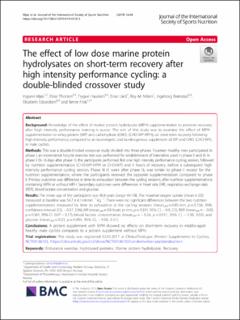The effect of low dose marine protein hydrolysates on short-term recovery after high intensity performance cycling: A double-blinded crossover study
Mjøs, Ingunn; Thorsen, Einar; Hausken, Trygve; Lied, Einar; Nilsen, Roy Miodini; Brønstad, Ingeborg; Edvardsen, Elisabeth; Frisk, Bente
Peer reviewed, Journal article
Published version

Åpne
Permanent lenke
https://hdl.handle.net/11250/2642984Utgivelsesdato
2019Metadata
Vis full innførselSamlinger
- Import fra CRIStin [3604]
- Institutt for helse og funksjon [584]
Originalversjon
Mjøs, I., Thorsen, E., Hausken, T., Lied, E., Nilsen, R. M., Brønstad, I., … Frisk, B. (2019). The effect of low dose marine protein hydrolysates on short-term recovery after high intensity performance cycling: a double-blinded crossover study. Journal of the International Society of Sports Nutrition, 16(1). 10.1186/s12970-019-0318-3Sammendrag
Background
Knowledge of the effect of marine protein hydrolysate (MPH) supplementation to promote recovery after high intensity performance training is scarce. The aim of this study was to examine the effect of MPH supplementation to whey protein (WP) and carbohydrate (CHO): (CHO-WP-MPH), on short-term recovery following high intensity performance, compared to an isoenergetic and isonitrogenous supplement of WP and CHO: (CHO-WP), in male cyclists.
Methods
This was a double-blinded crossover study divided into three phases. Fourteen healthy men participated. In phase I, an incremental bicycle exercise test was performed for establishment of intensities used in phase II and III. In phase II (9–16 days after phase 1), the participants performed first one high intensity performance cycling session, followed by nutrition supplementation (CHO-WP-MPH or CHO-WP) and 4 hours of recovery, before a subsequent high intensity performance cycling session. Phase III (1 week after phase II), was similar to phase II except for the nutrition supplementation, where the participants received the opposite supplementation compared to phase II. Primary outcome was difference in time to exhaustion between the cycling sessions, after nutrition supplementations containing MPH or without MPH. Secondary outcomes were differences in heart rate (HR), respiratory exchange ratio (RER), blood lactate concentration and glucose.
Results
The mean age of the participants was 45.6 years (range 40–58). The maximal oxygen uptake (mean ± SD) measured at baseline was 54.7 ± 4.1 ml∙min− 1∙kg− 1. There were no significant differences between the two nutrition supplementations measured by time to exhaustion at the cycling sessions (meandiff = 0.85 min, p = 0.156, 95% confidence interval (CI), − 0.37, 2.06), HR (meandiff = 0.8 beats pr.min, p = 0.331, 95% CI, − 0.9, 2.5), RER (meandiff = − 0.05, p = 0.361, 95% CI -0.07 – 0.17), blood lactate concentration (meandiff = − 0.24, p = 0.511, 95% CI, − 1.00, 0.53) and glucose (meandiff = 0.23, p = 0.094, 95% CI, − 0.05, 0.51).
Conclusions
A protein supplement with MPH showed no effects on short-term recovery in middle-aged healthy male cyclists compared to a protein supplement without MPH.
